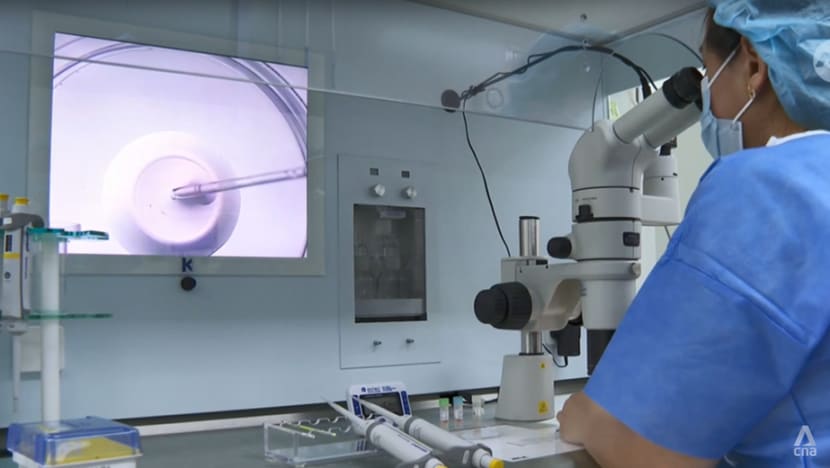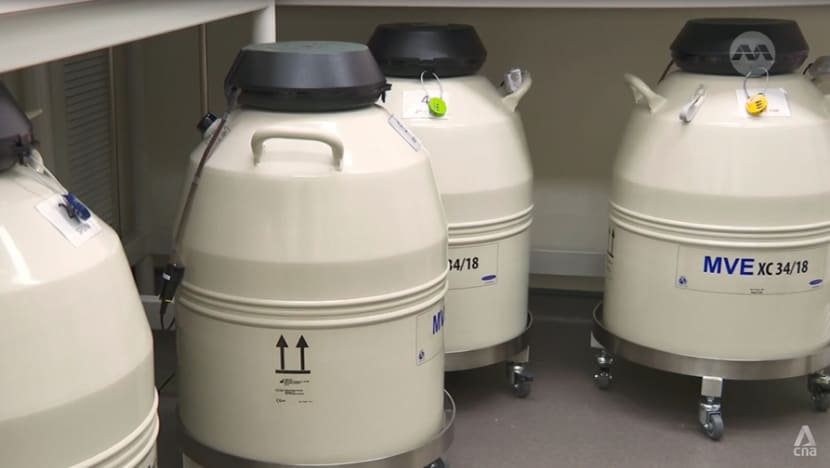More women, especially singles, seek to freeze their eggs in Singapore
Fertility clinics have seen an increase in both sign-ups and enquiries after the law was relaxed in July to allow women between 21 and 37 years old to undergo elective egg freezing.

A medical practitioner works during an elective egg freezing procedure in Singapore.

This audio is generated by an AI tool.
SINGAPORE: More women in Singapore are opting to freeze their eggs at fertility centres, with at least one seeing sign-ups double over the past few months.
This comes after the law was relaxed in July to allow women between 21 and 37 years old to undergo elective egg freezing.
It is a bid to give women the option to preserve fertility and conceive later in life, as more people put off marriage and having children until later in life.
MORE SIGN-UPS SINCE JULY
Fertility clinic Monash IVF Singapore has done 20 egg freezing procedures to date, double the number in July.
Enquiries have also increased by about 50 per cent.
The clinic currently has two tanks storing frozen embryos, one tank full of frozen eggs and another spare tank.
Each tank can store human eggs from about 160 women. They are kept frozen by liquid nitrogen at a constant -196 degrees Celsius.
MORE SINGLES OPTING FOR EGG FREEZING
Similarly, Thomson Medical Centre has seen an uptick in demand for the service since July. In the past five months, its doctors have done over 70 such procedures.
The clinic said a majority of patients who underwent the process are single women in their mid-30s, with aspirations to start a family of their own at a subsequent or different stage of their lives.
At Mount Elizabeth Fertility Centre, clinicians have been receiving around 100 enquiries asking for more information in the past few months – all of them from anxious singles.
“Especially at the age of 37, at the last minute, this group of patients have started calling and inquiring about what they need to do and when they need to start seeing a doctor,” said MsIrene Yuan, a senior staff nurse at the fertility centre.
While singles now have the option to freeze their eggs, only legally married couples will be able to use the frozen eggs for procreation.

DON’T DELAY, SAY DOCTORS
Doctors said younger women should not wait until the last minute, now that the law has changed.
Dr Suresh Nair, Monash IVF Singapore’s founding doctor, said the clinic spends time to counsel each patient on the pros and cons of egg freezing, and encourage those who can to start a family earlier.
“Our main emphasis is to look at her circumstances and encourage her … not to delay childbearing (unless) it’s for a medical reason. Another reasonable request is if a patient has not found someone suitable to start a family with,” he said.
This is because egg freezing is only the first step and success depends on the age they use them as well.
“The number of the eggs will decline with increasing age of the woman so as we grow older the number of eggs that our body will produce, even in response to medications that we give, will certainly reduce,” said Dr Anupriya Agarwal, from Mount Elizabeth Fertility Centre.
Older patients are less likely to get pregnant, while older mothers also face more health issues, said Dr Nair.
“If a woman has 20 eggs at age of 34, the chance of having a baby in the first round of 20 eggs is 90 per cent – pretty good. But the moment she goes into the 37 age bracket, it falls to a whopping 50 per cent," he said.
“Age is the biggest handicap, we can't help it, it is biology. Egg freezing is not a guarantee.”
COSTS FOR CONSIDERATION
Prices range around S$10,000 (US$7,500), excluding a yearly storage fee for the eggs.
With MediSave withdrawals, subsidies and co-funding not available for the procedure, some clinics are trying to waive certain fees or offer bundle deals to cushion the cost.
Another doctor said not all women want to endure the two-week process, which can be painful for some.
“We are trying to reduce the number of injections by using different medications, which need to be given once every few days only rather than every day,” said Dr Agarwal.
“In place of these injections for reducing the risk of ovulation, we give them oral medications to prevent ovulation from happening so all these things together, try and make it as pain free for the woman as possible.”
Mount Elizabeth Fertility Centre said the pills also make the procedure about S$500 cheaper.
Doctors said that while bearing children at a younger age is still more beneficial, the new law means women now have more choices.
“I think it is very empowering for younger women to have an option to think about fertility at a much later time. It is like buying an insurance policy.
They hope they never need to use it. But at least they have their eggs frozen so next time if they really need it, then they have some options,” said Dr Agarwal.


















